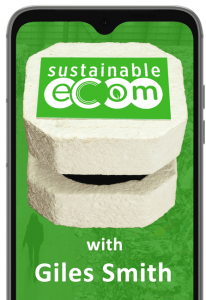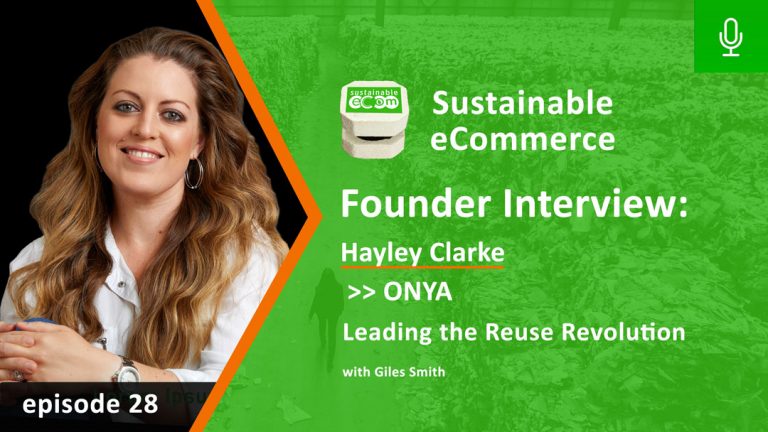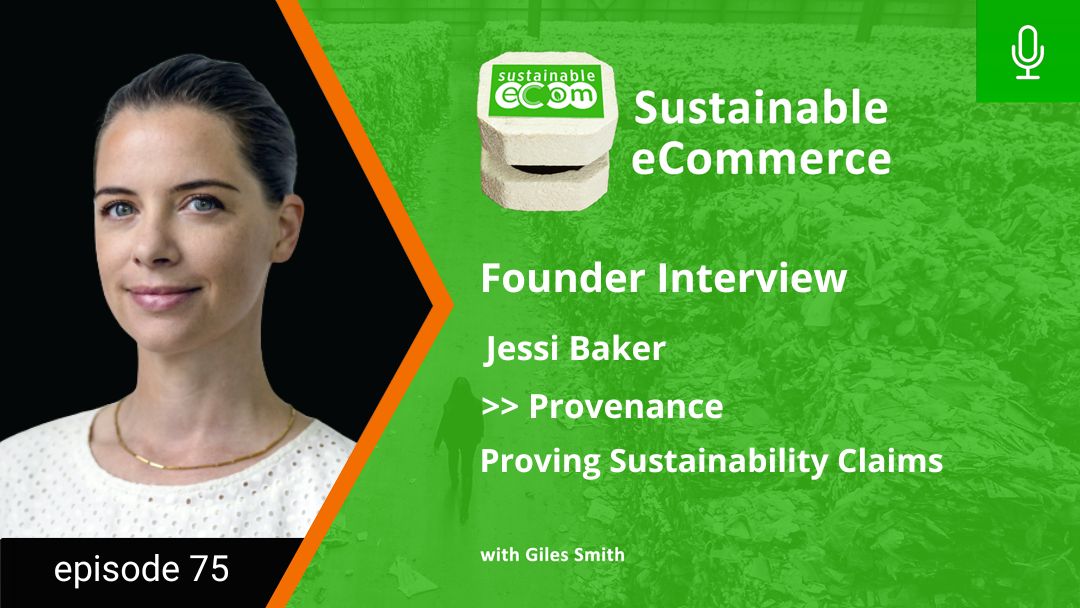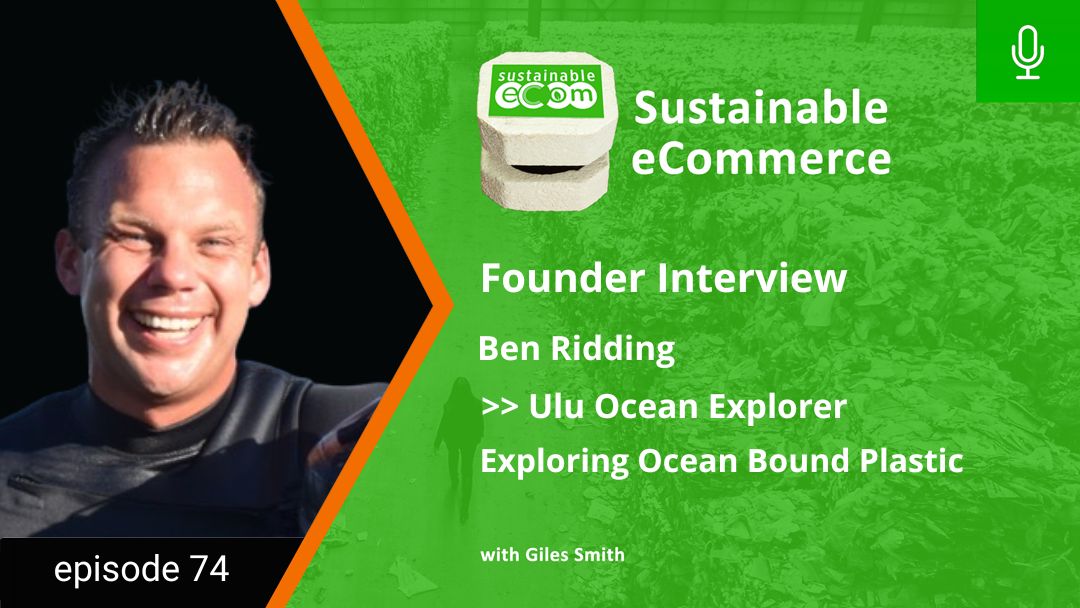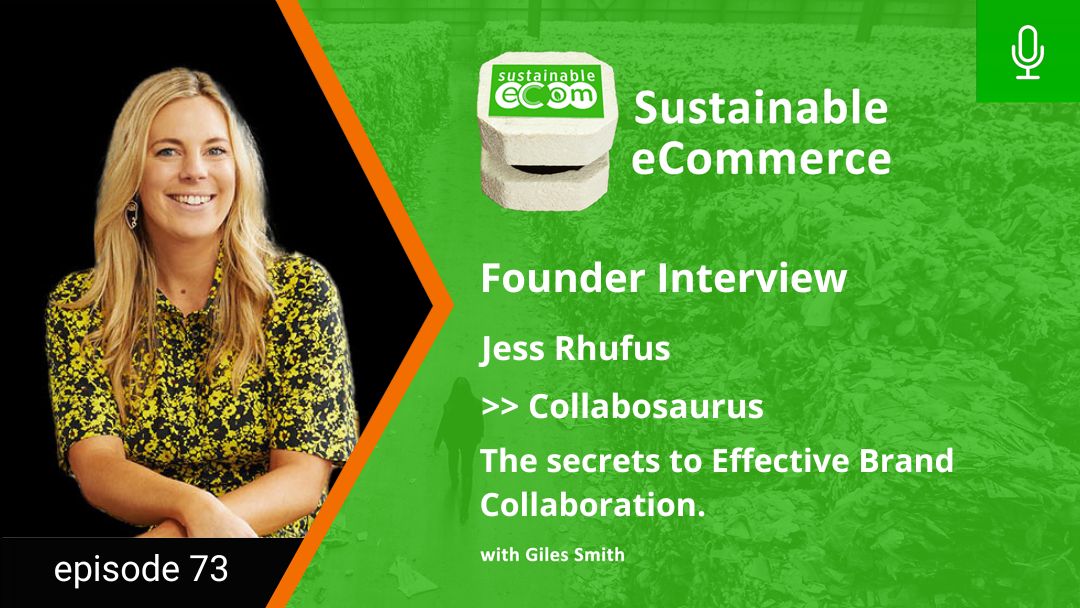Welcome to Episode 28 of the Sustainable Ecommerce Podcast!
When it comes to single use plastics, one of the key areas of focus for government intervention over the past few years has been shopping and produce bags.
Of course, retailers and supermarkets have been spun off in all different direction over the past decade, from biodegradable to re-usable but through it all one brand has been helping to change the game by providing collapsible produce bags designed to keep on you for whenever you need them. My guest today is Hayley Clarke Managing Director of WA brand ONYA who have been leading the charge against single use plastics since 2004!
Today the brand provides re-usable shopping bags, produce bags & beverage containers as well as a range of compostable waste bags. They were one of the earliest brands in Australia to gain B Corp certification, have become a 1% for the Planet member and ensure their workforce is climate positive through Ecologie.
It’s a rare privilege indeed to get to share in the stories from inside a sustainable brand that’s been running for over 20 years and I hope you enjoy learning from Hayley as much as I did.
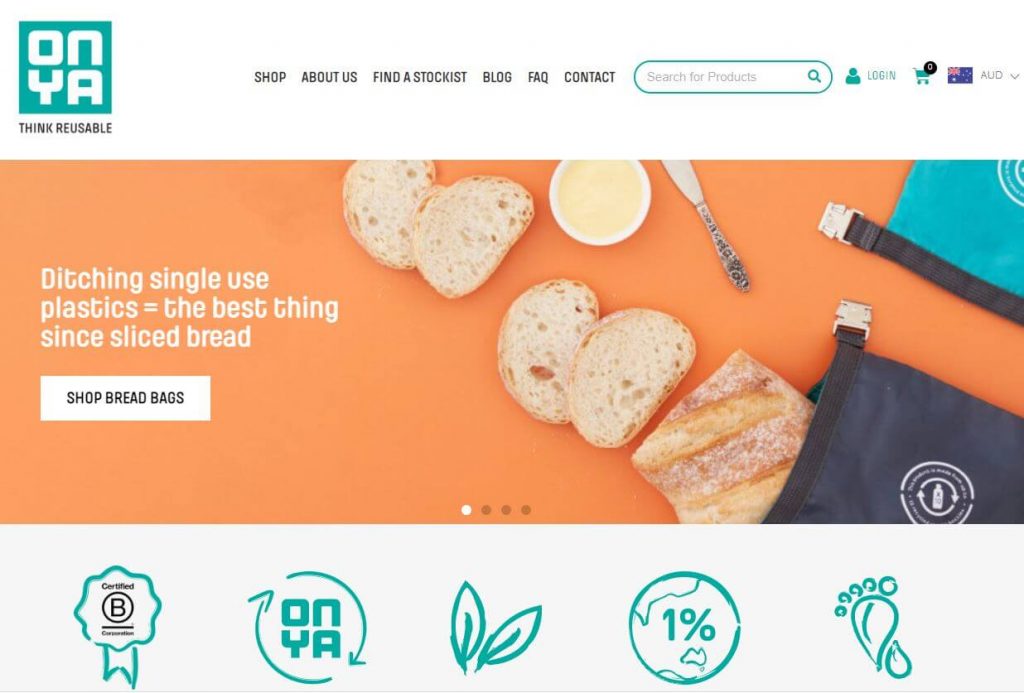
Giles Smith: Everywhere I look these days I see the Onya brand! Let's have a bit of backstory before we get into some nitty gritty details. You’re the are CEO, you picked up the business up back in 2015. Tell us about that journey.
Hayley Clarke: Well, my partner and myself had come from a national retail background. We had been franchisees for quite a big national retail group and we'd been doing that for the previous decade. We wanted to do something different. But we wanted to do something that was worthwhile and that was good. When the opportunity to purchase Onya came up, I realised I already had some of their products and I realised I loved the company so much that I bought it!
The company itself had been started by a guy called John Bruce. He'd done an amazing job, and invented these reusable bags that stuff into a pouch and you can keep ‘onya’ where the name comes from. He got to the end of his cycle where he thought he could take the business. And so it was great timing for us.
We could immediately introduce learnings from our retail background, especially around packaging, which was really needed to tell the story better. It’s made of post-consumer recycled materials that's printed with plant based inks and it's fully recyclable and compostable at the end of its life. Immediately sales shot up because people understood that they were reusable produce bags.
Initially our stockists had reservations about the packaging, they didn’t really want it, but the reality is that most don’t have the time or the staff to explain every product, so the packaging really has to do all the hard work.
Giles Smith: It's interesting you say that because it is a very powerful and important way to tell your story.
Hayley Clarke: It’s very important becase that packaging has to do all the heavy lifting of really explaining what it does. So, you need to think carefully about what’s important to be on that packaging? What do your customers really need to know? What pain points are you hitting?
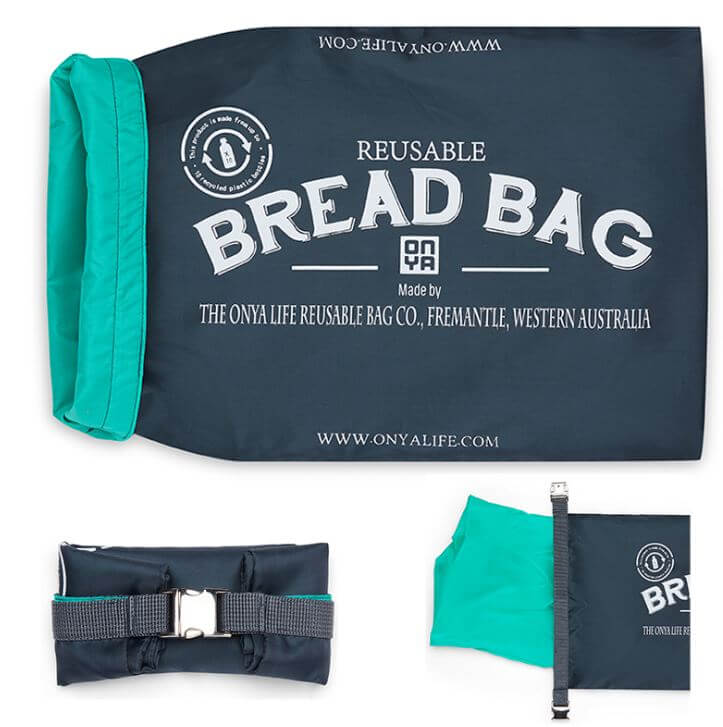
Giles Smith: I want to backtrack a bit because the brand started back in 2004 with the original founder. What an amazing foresight he had to see that this would be a thing. Because back in 2004, nobody was thinking about getting rid of single used plastic bags, were they?
Hayley Clarke: No it was on no one's radar.
Giles Smith: Even when you picked it up in 2015, it wasn't!
Hayley Clarke: That’s right
Giles Smith: How has all of that changed? How have the market dynamics changed of all that since you picked it up?
Hayley Clarke: I think anyone in sustainable space will say in Australia that, a lot of the big turnarounds started to come in 2017 when the War on Waste aired, on the ABC. That was pivotal in just getting the mass group of people to understand the issue around plastic pollution. That was a huge time for us as we were the only ones in Australia doing it. Demand exploded.
Giles Smith: Give us a sense if you can, of where you've taken the brand since that pivotal moment. What sort of sales was the brand doing when you picked it up and what have you achieved since?
Hayley Clarke: It was tiny at the time. One of the things that we did was we rebranded, we kept the name, but we rebranded. Since then our simple logo has worked brilliantly for us. We also introduced some new products to the range as well, including the bread bag. We were really looking bring out new products that we're actually solving a problem. It coincides with the rise of bulk buy food stores, which really helped too. And we worked very hard on awareness and education.
The rise of Plastic Free July was also a very important for us. I’m very lucky to call Rebecca Prince who first started it a good friend of mine, and we’ve been friends since 2011. They are an affiliate of ours, and we’re on their website which has also really helped to get the word out. I think individuals really like to feel empowered. Being able to take those steps and actually reduce waste and actually see your weekly bin nowhere near as full as it used to be is powerful.
Giles Smith: You've obviously focused a lot on that messaging because, that story of solving the problem and empowering the customer really comes out on your site. It makes it for a really compelling picture, doesn't it?
Hayley Clarke: Oh, thank you. Yes, absolutely. We're trying to just lift that mood and create that little bit more fun, around that. We also focus on making small changes. Make just one change, get confident with that, and once you're confident with that, move on to something else.
Giles Smith: Our job as brands is to activate people, but activate people one step at a time. One of the other things you said as well which I loved, was that you said that the products you make are designed to solve a problem.
Can you tell us a little bit about your product process? How do you come up with new products to add in that are worthwhile?
Hayley Clarke: Most of the tips that we get from our customers ourselves. You'll hear the same thing come up again and again. And so, then we'll say, Okay, is there anything that we can actually do about this? We think about the materials, what does its end of life look like? Where does it sit from a carbon, emission perspective?
Giles Smith: As the business owner, do you still make efforts to get in front of customers? Do you still call customers and see how they're going?
Hayley Clarke: I'm back in at customer care right now, which is actually where I love working. Covid was very difficult for us as it was for 99% of businesses. We had to downsize and bring more things back in house again. It’s allowed me to reconnect with customers again which is great. It's all about that connection.
Giles Smith: You're making your products out of contract factories in China. What would you say to someone who is looking to make their products in China? What sort of things should a sustainable brand be aware of?
Hayley Clarke: We’ve been very lucky we inherited most of our factories from John, so we’ve been working with us for years and years now.
I would say you should find a local and independent sourcing agent as a first step. There are some that have offices over here too so you can work with a local team at both ends. Once they have narrowed it down to three or four factories you really need to go there yourself. Build that personal relationship. You’ll need to get factories regularly audited. You’ll need to have eyes on the ground to check in regularly. While China does not have a history of child slave labour there can be other problems, especially fair wage concerns. But there are lots of good operators too.
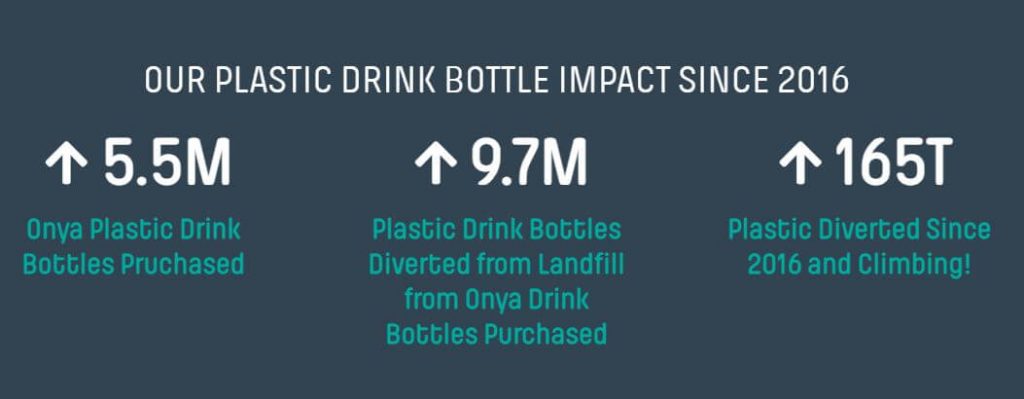
Giles Smith: What been your primary strategy for growing your business? What's working really, really well for you?
Hayley Clarke: The last couple of years have been a really difficult time for us. A lot of people, went back to single use plastic items thinking that they were more hygienic. I think a lot of people's priorities changed during covid and then it became about surviving mentally not just physically. But I’m proud to say we survived! Now the focus is really just about how do we pick up that momentum again?
Giles Smith: Coming into Covid then, what do you think would be your main focus in terms of growing your business? What channel, what strategy?
Hayley Clarke: I have discovered over the years that I don't think there's one silver bullet when it comes to marketing. I think it's a combination, of good marketing, consistent marketing across different channels. Just that consistency of message across different places. We've done everything from TVC to print media, to socials, we've done it all. So I don't think there is one silver bullet. I think it really is just about being consistent and with your messaging being out there and understand your customer. Understand what is important to them. How can we be relevant to them?
Giles Smith: Without understanding your customer, you can't clarify your message. And if your message is wrong, none of the channels are going to work.
Giles Smith: So once you’ve consolidated, what is next on the horizon for Onya?
Hayley Clarke: We have a warehouse in the UK that we opened in 2019, just before both COVID and BREXIT! I would love to really grow that UK side of the business. I think the potential for growth there is fantastic. In the Australian market we're quite mature, we have a lot of awareness here. There's definitely still more to go. And then the US of course, which is, which is a big one. We do have a bunch of stockists in the US. But, actually warehousing from there could be hugely successful for us. and being there in a more meaningful way, um, it, it has potential, um, to be hugely successful for us there as well.
Giles Smith: Do you see being a B Corp a stepping stone towards that?
Hayley Clarke: They recognize it easily there, so yes it helps.
Giles Smith: Hayley, where can people go and get your beautiful products?
Hayley Clarke: You can visit onyalife.com. We also have a list of our stockists on the site too, and we always like to support them.
Giles Smith: Hayley, it's been really good fun, and really inspirational chatting to you. Thank you for sharing so many lessons.
Hayley Clarke: I'm glad I could add some value. Thank you.
Top 3 Takeouts
I think for me one of the biggest takeouts was the importance of understanding your customer, understanding their problems, understanding the pressures they face, and how those pressures impact their priorities.
There are always great debates among marketers around what channel is working best, which you should be using and what strategies work best, but really none of that matters if you don’t understand your customer.
Understanding their pressure implies a regular checkin to see if you’re in tune with the customer’s view of the world, and adjust your messaging accordingly. Sure, some channels will bring you more traffic than others, but nothing will kill your traffic and your conversion quicker tone-deaf messaging!
Don’t dismiss manufacturing in China. There are definitely trade-offs involved, but the harsh reality is Australia simply may not have the manufacturing capability for your product and even if it does, the cost to produce may prevent you from being competitive on price, or perhaps worst still, diverting a percentage of your gross profit to your impact programmes.
But Hayley did recommend some important steps to ensuring your chosen factories meet your expected standards. Chief among those are using a local independent sourcing agent, independent auditors to check ethical practices and sustainable sourcing, and regular independent inspections, as well as visting and getting to know the factory owners and their families. Relationships really do matter when it comes to your supply chain!
Lastly, display packaging. How we love to hate it don’t we? But if products are being sold in retails environments the reality is that packaging needs to take the role of a sales assistant.
There’s a whole art and science to making your packaging stand out on the shelf, but at very least make sure your packaging shows what problem you’re solving, as well as what impact the customer will have but adding your item to their trolley!
So I hope you enjoyed today’s chat with Hayley. I’ll be back with you again next week with another inspiring founder interview from the world of sustainable ecommerce, so until then, keep building your brand for a healthier planet!





